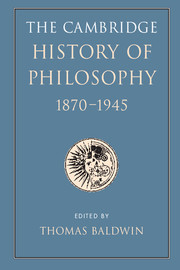Book contents
- Frontmatter
- Contents
- List of contributors
- Introduction
- I 1870–1914
- II 1914–1945
- 8 Logic and philosophy: the analytic programme
- 9 The diversity of philosophy
- 10 Knowledge, language, and the end of metaphysics
- 41 Sensible appearances
- 42 The renaissance of epistemology
- 43 The solipsism debates
- 44 Language
- 45 The end of philosophy as metaphysics
- 11 Philosophy and the exact sciences
- 12 Mind and its place in nature
- 13 Philosophy and social science
- 14 Ethics, religion, and the arts
- 15 Law and politics
- Biobibliographical appendix
- Bibliography
- INDEX
- References
45 - The end of philosophy as metaphysics
from 10 - Knowledge, language, and the end of metaphysics
Published online by Cambridge University Press: 28 March 2008
- Frontmatter
- Contents
- List of contributors
- Introduction
- I 1870–1914
- II 1914–1945
- 8 Logic and philosophy: the analytic programme
- 9 The diversity of philosophy
- 10 Knowledge, language, and the end of metaphysics
- 41 Sensible appearances
- 42 The renaissance of epistemology
- 43 The solipsism debates
- 44 Language
- 45 The end of philosophy as metaphysics
- 11 Philosophy and the exact sciences
- 12 Mind and its place in nature
- 13 Philosophy and social science
- 14 Ethics, religion, and the arts
- 15 Law and politics
- Biobibliographical appendix
- Bibliography
- INDEX
- References
Summary
The discussion in this chapter aims at clarifying the views of Heidegger and the later Wittgenstein on the idea of the end of philosophy. The chapter begins with a sketch of the conception of philosophy at issue in their work. There follows an examination of the idea of its end as it is developed first in the work of Heidegger and then in the work of Wittgenstein.
PHILOSOPHY AS METAPHYSICS
What both Heidegger and Wittgenstein mean by ‘philosophy’ when they broach the possibility of its ending is the understanding of non-empirical enquiry which is more usually characterised simply as ‘metaphysics’ (see Heidegger 1969 [1977: 432] and Wittgenstein 1968: §116). However, although both authors are engaged with questions concerning the end of philosophy qua metaphysics there is a prima facie difference in the way they approach this topic. For Heidegger the ‘end of philosophy’ is discussed primarily in terms of its terminus, and in particular in terms of the idea of its dissolution into empirical science. By contrast, for Wittgenstein the ‘end of philosophy’ is discussed primarily in terms of its telos or goal, and in particular in terms of the idea of its achievement of complete clarity concerning the foundations of the empirical sciences. I want to leave that contrast in the air for the moment in order first to highlight a significant confluence in their views, namely in their conception of what precisely the ‘metaphysical’ understanding of non-empirical enquiry is.
- Type
- Chapter
- Information
- The Cambridge History of Philosophy 1870–1945 , pp. 565 - 578Publisher: Cambridge University PressPrint publication year: 2003



